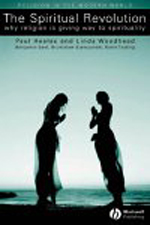So Much for That Old Time Religion
 It's beyond cliche to hear people describe themselves as "spiritual but not religious." Yet the phrase just won't go away -- and for good reason, say the authors of an important sociological study of trends in religion. Paul Heelas and Linda Woodhead, religion studies teachers at Lancaster University (UK), initiated the Kendal Project in the fall of 2000 to do extensive interviewing, observing, and studying both church attendance and traditional beliefs as well as attendance and adherence to a variety of spiritual practices such as yoga, tai chi, alternative healing, aromatherapy, energy work, spirituality circles, and dream groups.
It's beyond cliche to hear people describe themselves as "spiritual but not religious." Yet the phrase just won't go away -- and for good reason, say the authors of an important sociological study of trends in religion. Paul Heelas and Linda Woodhead, religion studies teachers at Lancaster University (UK), initiated the Kendal Project in the fall of 2000 to do extensive interviewing, observing, and studying both church attendance and traditional beliefs as well as attendance and adherence to a variety of spiritual practices such as yoga, tai chi, alternative healing, aromatherapy, energy work, spirituality circles, and dream groups.
The town of Kendal was chosen for the study because of its self-contained nature -- being far enough away from an urban area that people would stay put to get whatever they needed in the realm of religion or spirituality. What they found was that churches teaching people to locate authority outside of themselves are generally losing members and attendance. And groups -- be they churches or spirituality gatherings -- that are more "inner-directed" (they prefer the term subjective) are generally growing. In short, a focus on inner work in spirituality is more popular today than a focus on doctrine or religious tradition.
Heelas and Woodhead take the Kendal data and -- in a surprisingly accessible manner -- discuss what it means for religious institutions. Their point of view is pro-church without being in any way anti-New Age practices, even though those practices appear to be luring people away from churches. They conclude that churches honoring and nurturing the subjective have a chance of growing alongside this cafeteria-spirituality boom. But churches rigid in their insistence that people adhere to a particular belief system or "way of life" (which they describe as "life-as" religion) will decline.
One interesting point is that this does not mean that liberal or progressive churches will grow while the more theologically conservative ones will decline. Not at all. Some conservative and evangelical churches, they point out, have strong emphases on the subjective inner experience of God. They do, however, require assent to certain doctrines, so they end up with a blended focus. And some liberal or progressive churches adhere strongly to the "life-as" model in that they demand that followers live a life of Christian action promoting justice and peace -- and are openly derisive of spiritual activities that seem individualistic and self-serving.
Although the book points in some new directions, this fascinating sociological analysis doesn't engage in too much fortune-telling. What it does is give denominations, seminaries, and churches a valuable "birds-eye view" of the shifting terrain. The postmodern search for inner meaning is not going away.
It is not a fad. How churches respond to the emphasis on the subjective needs critical attention. How much of the subjective experience is incorporated into the life of the tradition while maintaining Christianity's emphasis on service to humanity could be the key to survival in a new age.